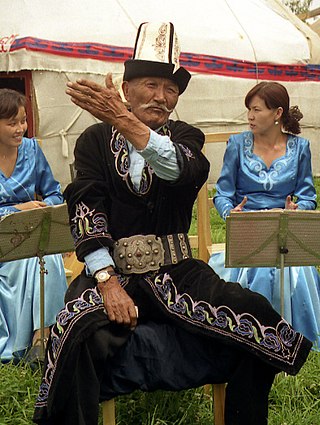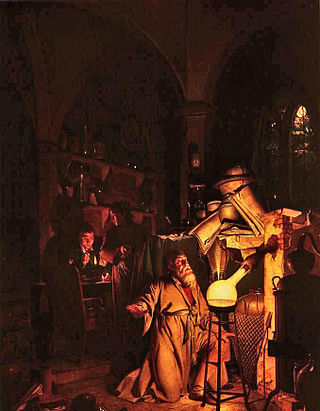Related Research Articles

A fairy tale is a short story that belongs to the folklore genre. Such stories typically feature magic, enchantments, and mythical or fanciful beings. In most cultures, there is no clear line separating myth from folk or fairy tale; all these together form the literature of preliterate societies. Fairy tales may be distinguished from other folk narratives such as legends and explicit moral tales, including beast fables. Prevalent elements include dwarfs, dragons, elves, fairies, giants, gnomes, goblins, griffins, mermaids, talking animals, trolls, unicorns, monsters, witches, wizards, and magic and enchantments.

A legend is a genre of folklore that consists of a narrative featuring human actions, believed or perceived to have taken place in human history. Narratives in this genre may demonstrate human values, and possess certain qualities that give the tale verisimilitude. Legend, for its active and passive participants, may include miracles. Legends may be transformed over time to keep them fresh and vital.

Oral tradition, or oral lore, is a form of human communication wherein knowledge, art, ideas and cultural material is received, preserved, and transmitted orally from one generation to another. The transmission is through speech or song and may include folktales, ballads, chants, prose or poetry. In this way, it is possible for a society to transmit oral history, oral literature, oral law and other knowledge across generations without a writing system, or in parallel to a writing system. Religions such as Buddhism, Hinduism, Catholicism, and Jainism, for example, have used an oral tradition, in parallel to a writing system, to transmit their canonical scriptures, rituals, hymns and mythologies from one generation to the next.

The Panchatantra is an ancient Indian collection of interrelated animal fables in Sanskrit verse and prose, arranged within a frame story. The surviving work is dated to about 200 BCE, but the fables are likely much more ancient. The text's author is unknown, but it has been attributed to Vishnu Sharma in some recensions and Vasubhaga in others, both of which may be fictitious pen names. It is likely a Hindu text, and based on older oral traditions with "animal fables that are as old as we are able to imagine".

Classical mythology, also known as Greco-Roman mythology or Greek and Roman mythology, is the collective body and study of myths from the ancient Greeks and ancient Romans. Mythology, along with philosophy and political thought, is one of the major survivals of classical antiquity throughout later Western culture. The Greek word mythos refers to the spoken word or speech, but it also denotes a tale, story or narrative.

Historical fantasy is a category of fantasy and genre of historical fiction that incorporates fantastic elements into a more "realistic" narrative. There is much crossover with other subgenres of fantasy; those classed as Arthurian, Celtic, or Dark Ages could just as easily be placed in historical fantasy. Stories fitting this classification generally take place prior to the 20th century.

Adrienne Mayor is a historian of ancient science and a classical folklorist.
Karuk traditional narratives include myths, legends, tales, and oral histories preserved by the Karuk (Karok) people of the Klamath River basin of northwestern California.
Traditional stories, or stories about traditions, differ from both fiction and nonfiction in that the importance of transmitting the story's worldview is generally understood to transcend an immediate need to establish its categorization as imaginary or factual. In the academic circles of literature, religion, history, and anthropology, categories of traditional story are important terminology to identify and interpret stories more precisely. Some stories belong in multiple categories and some stories do not fit into any category.

Albanian folk beliefs and mythological stories comprise the beliefs expressed in the customs, rituals, myths, legends and tales of the Albanian people. The elements of Albanian mythology are of ancient Paleo-Balkanic origin and almost all of them are pagan. Albanian folklore evolved over the centuries in a relatively isolated tribal culture and society. Albanian folk tales and legends have been orally transmitted down the generations and are still very much alive in the mountainous regions of Albania, Kosovo, western North Macedonia, lands formerly inhabited by Albanians like Montenegro and South Serbia and among the Arbëreshë in Italy and the Arvanites in Greece.

Elements of the supernatural and the fantastic were an element of literature from its beginning, though the idea of a distinct genre, in the modern sense, is less than two centuries old.

Incest is found in folklore and mythology in many countries and cultures in the world.
A legendary is a collection of saints' lives. The word derives from the Latin word legenda, meaning 'things to be read'. The first legendaries were manuscripts written in the Middle Ages, including collections such as the South English legendaries or the Golden Legend.

Literature is any collection of written work, but it is also used more narrowly for writings specifically considered to be an art form, especially prose fiction, drama, poetry, and including both print and digital writing. In recent centuries, the definition has expanded to include oral literature, also known as orature much of which has been transcribed. Literature is a method of recording, preserving, and transmitting knowledge and entertainment, and can also have a social, psychological, spiritual, or political role.
Myth is a folklore genre consisting of narratives that play a fundamental role in a society, such as foundational tales or origin myths.

Roman mythology is the body of myths of ancient Rome as represented in the literature and visual arts of the Romans. One of a wide variety of genres of Roman folklore, Roman mythology may also refer to the modern study of these representations, and to the subject matter as represented in the literature and art of other cultures in any period. Roman mythology draws from the mythology of the Italic peoples and ultimately from Proto-Indo-European mythology.
Ancient Greek folklore consists of the folklore of the ancient Greeks. The topic includes genres such as mythology, legend, and folktales. According to classicist William Hansen: "the Greeks and Romans had all the genres of oral narrative known to us, even ghost stories and urban legends, but they also told all kinds that in most of the Western world no longer circulate orally, such as myths and fairytales."
William Hansen is an American academic who is a professor emeritus of classical studies and folklore at Indiana University Bloomington.

Themes of transformations are found in all types of mythologies and folklore. Greek mythology features a wide collection of myths where the subjects are physically transformed, usually through either divine intervention or sorcery and spells. Stories of shapeshifting within Greek context are old, having been part of the mythological corpus as far back as the Iliad of Homer. Usually those legends include mortals being changed as punishment from a god, or as a reward for their good deeds. In other tales, gods take different forms in order to test or deceive some mortal. There is a wide variety of type of transformations; from human to animal, from animal to human, from human to plant, from inanimate object to human, from one sex to another, from human to the stars (constellations).

The Weasel and Aphrodite, is one of Aesop's Fables, numbered 50 in the Perry Index. A fable on the cynic theme of the constancy of one's nature, it serves as a cautionary tale against trusting those with evil temper, for even if they might change their body, they will not change their mind.
References
- Anderson, Graham. 2006. Greek and Roman Folklore: A Handbook. Greenwood press
- Busk, Rachel Hariette. 1877. Roman Legends: A Collection of the Fables and Folk-lore of Rome. Estes and Lauriat.
- Halliday, William Reginald. 1927. Greek and Roman Folklore. G. C. Harrap.
- Hansen, William. 2019. The Book of Greek and Roman Folktales, Legends, and Myths. Princeton University Press.